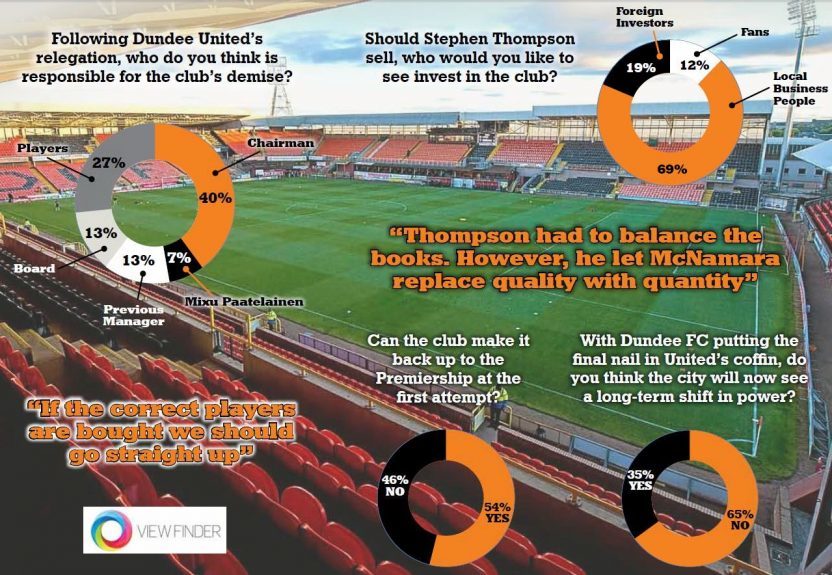A LARGE majority of Arabs want Dundee United locally controlled, even if chairman Stephen Thompson’s search for new investors leads to him selling up.
And, despite the turmoil at Tannadice right now, most fans believe the team under new manager Ray McKinnon will bounce back to the Premiership at the first time of asking.
Those were the big findings of an Evening Telegraph online survey that saw huge numbers take the chance to air their views in the wake of relegation this season.
Hundreds, not just those who follow the Tangerines, completed our poll and came up with very interesting answers.
While some of the biggest clubs in the world have foreign ownership and American Tim Keyes is the main man at city rivals Dundee, the message in these parts is clear — when it comes to the people in the boardroom, those with local knowledge are the best bet.
If Thompson goes, Arabs want people whose veins run with Tangerine blood to move in.
Of the hundreds of United fans who took part, almost 70% were in favour of business people from this area stepping forward to take over if the current regime stand down.
Only approaching 12% felt a fan-owned club was a good idea, while 11.5% would have no worries over foreign investment.
When it comes to picking the team, it’s clear the appointment of a man with strong Tannadice connections in McKinnon has boosted supporter confidence.
Despite facing a major rebuild of the squad and without even seeing his first signing, almost 54% felt promotion next term is a distinct possibility.
That can be taken as a reflection of the feeling in McKinnon, who led Raith Rovers to the play-offs, United have snapped up the right man.
While such optimism is encouraging, fingers have been pointed at the chairman as the person with the biggest responsibility for relegation.
The players, as well as previous managers Jackie McNamara and Mixu Paatelainen, must take their fair share of the blame.
Just shy of 40% believed it lies with Thompson. A whisker under 27% felt the team on the park did the damage, while Paatelainen at 7% and McNamara (12.5%) did not escape supporter wrath either. The remainder of those answering said the board as a whole should stand up and be counted for the disaster.
Although it’s interesting more felt let down by players than the men who picked the team, there was a recognition some did more than others to keep United in the top flight.
Asked who they’d like to see kept on, there was massive support for long-serving John Rankin.
Fans were asked to list those they’d like to see in tangerine again and most included the 32-year-old’s name.
Fellow-midfielder Paul Paton’s name was also extensively mentioned, while the general opinion is the decision to keep the likes of striker Simon Murray, Scott Fraser, Blair Spittal and club captain Sean Dillon is well supported.
The Arab who wanted Paul Sturrock restored to the squad and Jim McLean back as manager will be disappointed.
United, saw the drop confirmed when they lost at arch rivals Dundee and, for the first time in over 50 years, the Dark Blues will now be playing in a higher league.
Even so, United fans and some of those whose allegiances are elsewhere, are not yet prepared to accept they are now playing second fiddle to the lot from over the road.
Some 65% do not believe recent events can be taken as a sign of a long-term shift in power from tangerine to dark blue.

